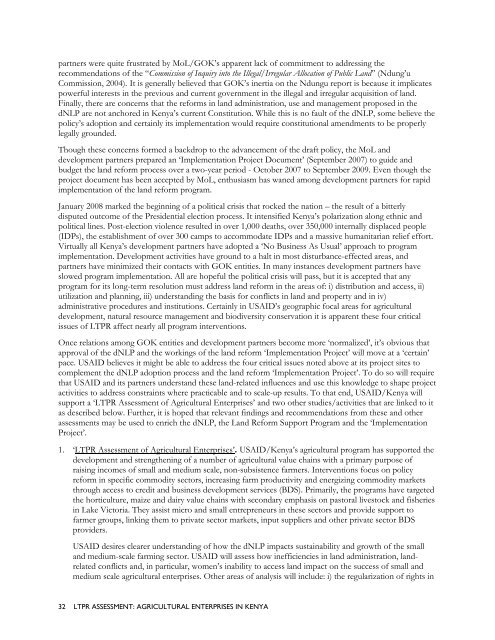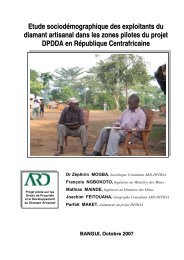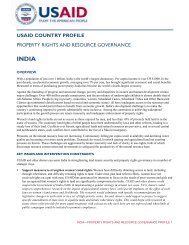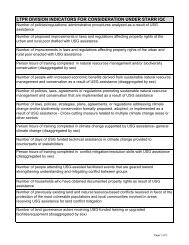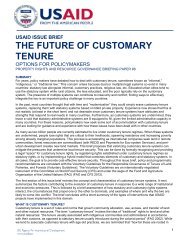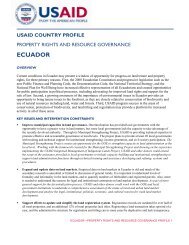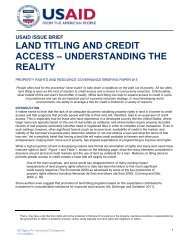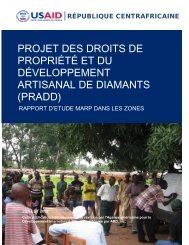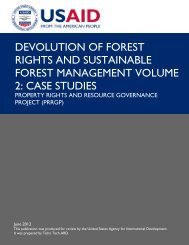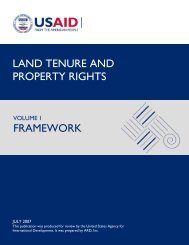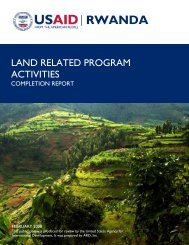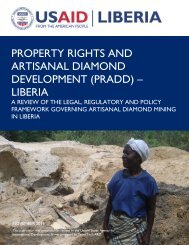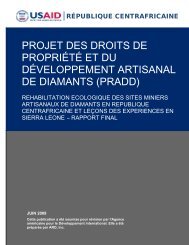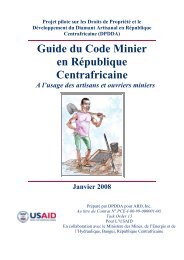Agricultural Enterprise Initiatives of USAID/Kenya - Land Tenure and ...
Agricultural Enterprise Initiatives of USAID/Kenya - Land Tenure and ...
Agricultural Enterprise Initiatives of USAID/Kenya - Land Tenure and ...
Create successful ePaper yourself
Turn your PDF publications into a flip-book with our unique Google optimized e-Paper software.
partners were quite frustrated by MoL/GOK’s apparent lack <strong>of</strong> commitment to addressing the<br />
recommendations <strong>of</strong> the “Commission <strong>of</strong> Inquiry into the Illegal/Irregular Allocation <strong>of</strong> Public <strong>L<strong>and</strong></strong>” (Ndung’u<br />
Commission, 2004). It is generally believed that GOK’s inertia on the Ndungu report is because it implicates<br />
powerful interests in the previous <strong>and</strong> current government in the illegal <strong>and</strong> irregular acquisition <strong>of</strong> l<strong>and</strong>.<br />
Finally, there are concerns that the reforms in l<strong>and</strong> administration, use <strong>and</strong> management proposed in the<br />
dNLP are not anchored in <strong>Kenya</strong>’s current Constitution. While this is no fault <strong>of</strong> the dNLP, some believe the<br />
policy’s adoption <strong>and</strong> certainly its implementation would require constitutional amendments to be properly<br />
legally grounded.<br />
Though these concerns formed a backdrop to the advancement <strong>of</strong> the draft policy, the MoL <strong>and</strong><br />
development partners prepared an ‘Implementation Project Document’ (September 2007) to guide <strong>and</strong><br />
budget the l<strong>and</strong> reform process over a two-year period - October 2007 to September 2009. Even though the<br />
project document has been accepted by MoL, enthusiasm has waned among development partners for rapid<br />
implementation <strong>of</strong> the l<strong>and</strong> reform program.<br />
January 2008 marked the beginning <strong>of</strong> a political crisis that rocked the nation – the result <strong>of</strong> a bitterly<br />
disputed outcome <strong>of</strong> the Presidential election process. It intensified <strong>Kenya</strong>’s polarization along ethnic <strong>and</strong><br />
political lines. Post-election violence resulted in over 1,000 deaths, over 350,000 internally displaced people<br />
(IDPs), the establishment <strong>of</strong> over 300 camps to accommodate IDPs <strong>and</strong> a massive humanitarian relief effort.<br />
Virtually all <strong>Kenya</strong>’s development partners have adopted a ‘No Business As Usual’ approach to program<br />
implementation. Development activities have ground to a halt in most disturbance-effected areas, <strong>and</strong><br />
partners have minimized their contacts with GOK entities. In many instances development partners have<br />
slowed program implementation. All are hopeful the political crisis will pass, but it is accepted that any<br />
program for its long-term resolution must address l<strong>and</strong> reform in the areas <strong>of</strong>: i) distribution <strong>and</strong> access, ii)<br />
utilization <strong>and</strong> planning, iii) underst<strong>and</strong>ing the basis for conflicts in l<strong>and</strong> <strong>and</strong> property <strong>and</strong> in iv)<br />
administrative procedures <strong>and</strong> institutions. Certainly in <strong>USAID</strong>’s geographic focal areas for agricultural<br />
development, natural resource management <strong>and</strong> biodiversity conservation it is apparent these four critical<br />
issues <strong>of</strong> LTPR affect nearly all program interventions.<br />
Once relations among GOK entities <strong>and</strong> development partners become more ‘normalized’, it’s obvious that<br />
approval <strong>of</strong> the dNLP <strong>and</strong> the workings <strong>of</strong> the l<strong>and</strong> reform ‘Implementation Project’ will move at a ‘certain’<br />
pace. <strong>USAID</strong> believes it might be able to address the four critical issues noted above at its project sites to<br />
complement the dNLP adoption process <strong>and</strong> the l<strong>and</strong> reform ‘Implementation Project’. To do so will require<br />
that <strong>USAID</strong> <strong>and</strong> its partners underst<strong>and</strong> these l<strong>and</strong>-related influences <strong>and</strong> use this knowledge to shape project<br />
activities to address constraints where practicable <strong>and</strong> to scale-up results. To that end, <strong>USAID</strong>/<strong>Kenya</strong> will<br />
support a ‘LTPR Assessment <strong>of</strong> <strong>Agricultural</strong> <strong>Enterprise</strong>s’ <strong>and</strong> two other studies/activities that are linked to it<br />
as described below. Further, it is hoped that relevant findings <strong>and</strong> recommendations from these <strong>and</strong> other<br />
assessments may be used to enrich the dNLP, the <strong>L<strong>and</strong></strong> Reform Support Program <strong>and</strong> the ‘Implementation<br />
Project’.<br />
1. ‘LTPR Assessment <strong>of</strong> <strong>Agricultural</strong> <strong>Enterprise</strong>s’. <strong>USAID</strong>/<strong>Kenya</strong>’s agricultural program has supported the<br />
development <strong>and</strong> strengthening <strong>of</strong> a number <strong>of</strong> agricultural value chains with a primary purpose <strong>of</strong><br />
raising incomes <strong>of</strong> small <strong>and</strong> medium scale, non-subsistence farmers. Interventions focus on policy<br />
reform in specific commodity sectors, increasing farm productivity <strong>and</strong> energizing commodity markets<br />
through access to credit <strong>and</strong> business development services (BDS). Primarily, the programs have targeted<br />
the horticulture, maize <strong>and</strong> dairy value chains with secondary emphasis on pastoral livestock <strong>and</strong> fisheries<br />
in Lake Victoria. They assist micro <strong>and</strong> small entrepreneurs in these sectors <strong>and</strong> provide support to<br />
farmer groups, linking them to private sector markets, input suppliers <strong>and</strong> other private sector BDS<br />
providers.<br />
<strong>USAID</strong> desires clearer underst<strong>and</strong>ing <strong>of</strong> how the dNLP impacts sustainability <strong>and</strong> growth <strong>of</strong> the small<br />
<strong>and</strong> medium-scale farming sector. <strong>USAID</strong> will assess how inefficiencies in l<strong>and</strong> administration, l<strong>and</strong>related<br />
conflicts <strong>and</strong>, in particular, women’s inability to access l<strong>and</strong> impact on the success <strong>of</strong> small <strong>and</strong><br />
medium scale agricultural enterprises. Other areas <strong>of</strong> analysis will include: i) the regularization <strong>of</strong> rights in<br />
32 LTPR ASSESSMENT: AGRICULTURAL ENTERPRISES IN KENYA


